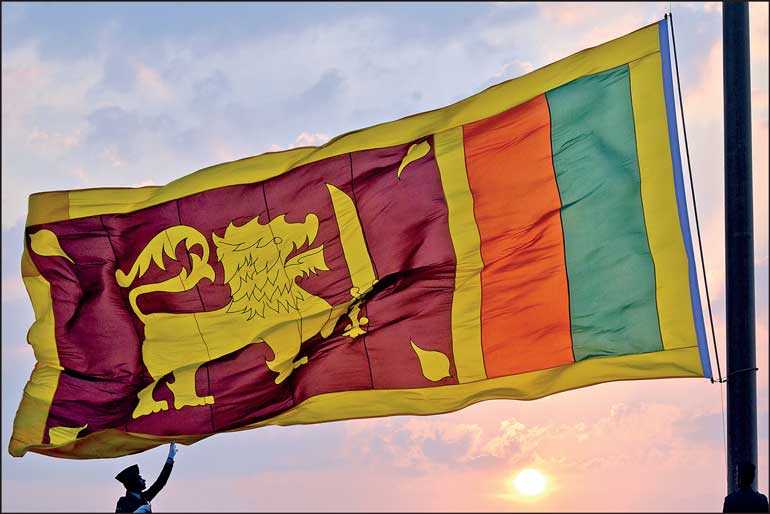Sunday Feb 15, 2026
Sunday Feb 15, 2026
Thursday, 11 April 2019 00:00 - - {{hitsCtrl.values.hits}}

A country’s foreign policy, also called the foreign relations policy, consists of self-interest strategies chosen by the state to safeguard its national interests and to achieve its goals within international relations milieu. Since the national interests are paramount, foreign policies are designed by the government through high-level decision making processes. 
Regardless of political affiliations majority will agree that the pinnacle of Sri Lanka’s foreign policy approach was only evidenced in 1970s and since then it deteriorated to an extent that it is hardly recoverable given the current global political compulsions. Global power structure was rationally balanced as we had two powerful political camps, namely the West led by United States (US) and the East led by Union of Soviet Socialist Republics (USSR), until it was officially dissolved on 31 December 1991.
Likeminded 120 independent developing nations that are not formally aligned with or against any major political bloc formed an alliance called Non-Aligned Movement (NAM). Sri Lanka, under the Chairpersonship of late Sirima Bandaranaike brought this movement to its zenith in mid 1970s with the help of concurring world leaders. This grouping, which represented over a massive two-thirds of the world population, demonstrated its strength as a formidable force in the international arena becoming a major concern for two traditional global powers, specially the US. NAM was the second largest group of likeminded states after the United Nations.
As a trustworthy and responsible nation, Sri Lanka enhanced its image to the highest level at an international forum through this alliance in 1970s. Such a deed should to be acknowledged as the highest recognition Sri Lanka has ever achieved in an international arena over the last 70 years. In the context of our representative population and landmass within this group, it was an extraordinary achievement.
Development since 1970s
After the United National Party (UNP) won a landslide victory in the 1977 General Election, the role of the presidency of NAM was entrusted to the new Prime Minister J.R. Jayewardene. In light of the party’s traditional alliance with the West, the new President of NAM failed to demonstrate the required commitment to protect its place in the global community and NAM as a formidable organisation started to move away from its significance in the geopolitical arena.
Additionally, the resurgence of oil rich countries after forming Organisation of Petroleum Exporting Countries (OPEC) as a formidable world economic power could have marginally contributed to the worsening of the status of NAM.
Pro-Western policies such as open and market economic approach based on the guidance of the long arm of Western powers such as the World Bank and International Monetary Fund were enthusiastically and hurriedly implemented by Sri Lanka irrespective of whether they were detrimental to the long-term prosperity of the nation or have any bearing in regional politics.
 |
Our leaders should understand ground realities, at least now, and try to move out of this muddled environment rather than trying to please the West for just retaining their positions and thereby putting the whole nation’s future in jeopardy |
Not only did Sri Lanka develop a substantial faith in relations with the US and its allies, it also started to antagonise the closest formidable nation, India, which was aligned with the Soviet Bloc at that time, by failing to give due consideration to geopolitical setting in the region. This can be termed as the gross miscalculation of Sri Lanka’s foreign policy in its modern history.
South Asian milieu
Centred on India’s geopolitical interest as well as having a strategically located neighbour aligned with the opposition power bloc, India embarked on an adversarial role to destabilise Sri Lanka ethnically, politically and economically. This resulted in training and arming of rebel groups such as LTTE, PLOTE, etc. to dampen the accelerated economic progress being achieved with the blessing of the Western bloc and the open economic policies. Once the civil conflict started in the north and east, Sri Lanka’s rapid economic growth came to a standstill. Since 1980s Sri Lankans had to live with a frightening civil conflict for nearly 30 years during which scarce Government resources were allocated to meet conflict related expenditure instead of economic development and the welfare of the citizenry. While Sri Lanka was economically, politically and socially bled, India achieved its objective of destabilising its adversarial neighbour more than it bargained for partially due to the egotistic attitude of some leaders in Sri Lanka.
While maintaining this massive leverage to destabilise Sri Lanka at will, India forcibly and unethically got the Sri Lankan Government to pass legislations to abruptly devolve administrative powers to especially the north and east by establishing provincial councils throughout the country. This resulted in unnecessary duplication of tasks, more levels of governments in addition to economically unviable and administratively unfeasible regional units throughout the country.
This exercise can be seen as a creating of a white elephant with detrimental effects to Sri Lanka’s budgetary position forever while around 90% of the population didn’t want such power decentralisation as the size of the country wouldn’t mandate such devolutions. Sri Lanka is incurring heavy annual expenditure regularly to maintain provincial councils they never sought.
Ironically, India also had to pay a price as it faced heavy human as well as material losses while fighting the LTTE and also losing one of its prime ministers to a suicide bomb. Such an environment will go into the history as clear foreign policy disasters not only for both countries involved but for the whole humanity as over 100,000 people were killed in fighting and many more injured during the 30-year-long war beside a colossal loss of properties and valuable infrastructure.
India is still maintaining its influence on Sri Lanka by mostly funding projects in Tamil domiciled areas, maintaining closer relationships with these communities and also by influencing decisions on Sri Lanka in international forums like UNHRC. Such behaviours clearly demonstrate that India has not mitigated its ambitions in South Asia which could also be partly due to political compulsions they encounter in South India as over 50 million Tamils are domiciled there.
Geopolitical compulsions and the role of the diaspora
It appears that for a long time Sri Lanka failed to understand electoral compulsions of Western countries due to the effective Tamil vote base in their backyards where Tamils can sometimes become the deciding factor in a number of constituencies that in turn could become kingmakers of those nations, especially in Canada and the UK.
Politicians or their parties in these countries are encouraged to lobby international forums on behalf of the Tamil diaspora and openly try to twist the decision-making process to please their voter base. Additionally, some members of the diaspora are taking every step possible or opportunities to destabilise Sri Lanka and use it for realising their long-held aspirations.
Is a broader alliance with one group a viable proposition?
Opportunities to end the civil conflict much earlier than did, while saving many lives and enormous amount of expenditure, were also hampered by India’s mediation. In this environment the then Sri Lankan Government desperately looked for its traditional allies, the West, to support its war effort. President Jayewardene openly pleaded his Western allies to support him to bring the civil war to an end though these requests fell on deaf years of those nations while only regional ally Pakistan was helpful in many ways during this time.
Sri Lanka sadly failed to realise the ‘a friend in need is a friend indeed’ notion though and heavily aligned with the West. No doubt that there were other domestic political compulsions too for not receiving required assistance from those nations to fight the civil conflict in Sri Lanka.
The current Government appears to be highly dependent on the West for its political survival though this will not clear the progressive path for Sri Lanka to its destiny and prosperity. Sri Lanka will never be able to realise its potential by aligning to the West as far as the Tamil diaspora and some religious elements are active in Western countries. Leaders of these nations are handicapped due to sheer lobbing tactics used by Tamil diaspora and other groups even if they have genuine intentions to help Sri Lanka or leave it alone to mind its own businesses. The current Sri Lankan Government is forced to seek the support of the Tamil National Alliance, the domestic alliance of the Tamil diaspora, even to stay in power during the period they were elected for.
Our leaders should understand ground realities, at least now, and try to move out of this muddled environment rather than trying to please the West for just retaining their positions and thereby putting the whole nation’s future in jeopardy. Staying in power will only help handful of individuals but over 20 million people in the country will suffer while both their standard of living and economic prosperity is being deteriorated on daily basis.
Sri Lanka would never realise its potential if any party or a leader purely dependent on life support from the West stays in power. If the leader is ignoring these ground realities, patriotic members of their parties should look for alternatives without dragging the country into a further downhill spiral.
Current and potential leaders should carefully consider geopolitical compulsions and guide the country forward aligning with nations which do not interfere with the internal affairs of the country. Roles played by diplomats from Western countries in the recent political upheaval can be categorised as the lowest level of diplomatic protocol ever experienced by any independent nation. Our leaders could have showed these envoys their due place to safeguard the sovereignty of the country, but again in this instance too political compulsions rather than the nation’s interests played a much bigger role.
Role of the voters
Disregarding the traditional political parry alliances, voters should be mindful of who do they elect to represent them as 2019 is going to be an important year in the country’s political landscape. Progressive parties/groups and their members need to educate the voters on real issues Sri Lanka faces such as protecting its sovereignty and territorial integrity so that voters will be better informed when deciding to cast their votes. Voters should also be educated to understand who our traditional, helpful and useful friends are that can be reached out to for help when required.
Our nation should be intelligent enough, as we are blessed with an intellectual citizenry due to decades-old free education up to and including tertiary level that is not available in other nations in the South Asia, to understand the hidden threats coming in disguise as genuine. Some examples are foreign-funded initiatives like ‘rule of law,’ ‘protesting peacefully’ and other such initiatives which are detrimental to any country’s survival and prosperity if we carefully examine the consequences experienced by Middle Eastern nations recently. Even the past roles played by envoys appointed to overseas missions in Sri Lanka should be food for thought for our future leaders and policymakers.
Having a good scrutiny on any assistance, financial or otherwise, we received in the past from other nations will certainly divulge whether Sri Lanka received genuine and generous assistance from these nations. Being in the Western bloc, countries like Japan appear relatively to be friendly nation to Sri Lanka based on its commitment to the general welfare of the citizenry irrespective of which political party is in power. Nations like Germany lost such status during the last few decades when we examine its role in the international community in matters dealing with Sri Lanka. Sri Lanka had many instances in the past to learn lessons from extraterritorial interventions and use them as guiding factors when dealing with other nations.
Vision for a healthy foreign policy
The strategic location of Sri Lanka creates additional opportunities as well as challenges in calculating the influences from extra regional powers, including India. Seen from a comprehensive perspective, the issue is that Sri Lanka has been gradually moving from the periphery to the centre of global discussion because of its rising strategic significance due to its location.
Furthermore, beyond what other nations do, Sri Lanka’s leaders should also consider pragmatism coupled with a more confident contention of Sri Lankan interests to continue to be the main guiding principles when making foreign policy decisions. The country’s leaders have failed in this exercise in some senses over many years, in part not only due to their own lapses but also wider factors such as the absence of geopolitical and foreign policy discussions within the country’s domestic politics in addition to a foresight of leaders away from their self-centred attitudes.
Such a scenario leads to a path on which the next leaders need to invest in institutionalising the foreign policy of Sri Lanka rather than persisting with the overly personalised foreign policy which exists today and has been followed by many others in the past. The nation requires a more institutionalised foreign and national security policy, which is required especially in today’s geopolitical context. If Sri Lankan leaders constantly change their foreign policies for their own interest, against the national interest, we will end up failing to balance our foreign policy priorities and will continue to experience diabolical consequences.
Future leaders should get a leaf out from the delicate foreign policy adopted by Sri Lanka during Indo-Pakistan war in 1970s by allowing both sides in the conflict to utilise Sri Lanka’s airspace for their war efforts without antagonising any party. Sri Lanka ought to be ready to work with anyone and everyone to secure its interests. Our foreign policy should be framed to safeguard its interests and to achieve its goals, such as economic prosperity and welfare of the citizenry, within international milieu.
Geographical positioning enjoyed by our nation is an immense blessing and our leaders should be capable enough to use this rare prospect for the nation’s long-term prosperity rather than transforming it into an unnecessary burden on the inhabitants of the nation.
(The writer is a graduate from the University of Sri Jayewardenepura; as well as Sri Lanka Law College and completed his postgraduate studies in Canada and Australia. He is a visiting lecturer of the MBA program at the Sydney Business School and currently working for the Australian Government. He can be reached via [email protected].)